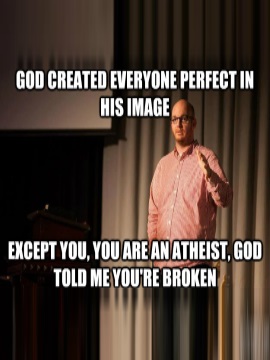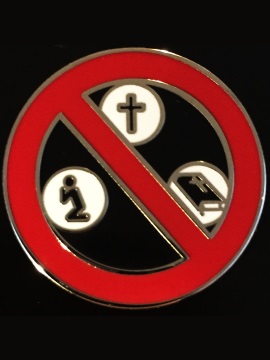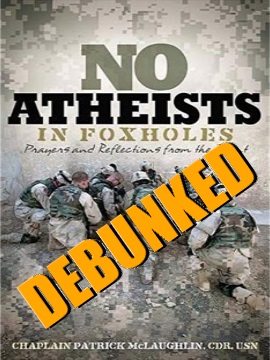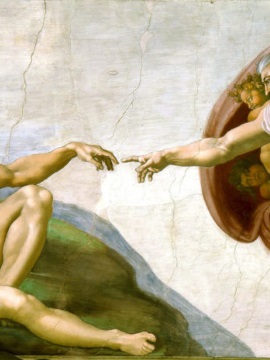Is Religion A Force For Good?
James C. Rocks [2023-09-22]
 The claim is often made that atheism is immoral and that religion is essential for any moral life to be lived yet the evidence suggests nothing could be further from the truth.
The claim is often made that atheism is immoral and that religion is essential for any moral life to be lived yet the evidence suggests nothing could be further from the truth.
Atheism Day
James C. Rocks [2022-04-01]
 A few days ago, I learned that March 23rd is Atheist Day. That means I ought to write something about it and, naturally, it ought to be about atheism. I plumped for, "What do I think atheism is (on a personal level)?", "What does atheism mean to me?" and "What do I think an atheist should be?" Sadly, that's more than a little complicated.
A few days ago, I learned that March 23rd is Atheist Day. That means I ought to write something about it and, naturally, it ought to be about atheism. I plumped for, "What do I think atheism is (on a personal level)?", "What does atheism mean to me?" and "What do I think an atheist should be?" Sadly, that's more than a little complicated.
No, I'm Not Broken!
James C. Rocks [2016-05-01]
 I am an atheist and pretty damned proud of being one! I like that I don't subscribe to anyone's particular way of thinking. Of course, like anyone else, I am influenced by views I hear or read but I believe I think about those things and decide whether or not they make any sense. Whether I use it or not all the time, I believe I have the ability to think critically ... that's why I am a fan of science, why I am an atheist and, more recently, why I am not a Brexiter. I like to think of it as an alarm bell, a bullshit-o-meter that goes off whenever I think something doesn't feel or smell right.
I am an atheist and pretty damned proud of being one! I like that I don't subscribe to anyone's particular way of thinking. Of course, like anyone else, I am influenced by views I hear or read but I believe I think about those things and decide whether or not they make any sense. Whether I use it or not all the time, I believe I have the ability to think critically ... that's why I am a fan of science, why I am an atheist and, more recently, why I am not a Brexiter. I like to think of it as an alarm bell, a bullshit-o-meter that goes off whenever I think something doesn't feel or smell right.
Why I Am An Atheist
James C. Rocks [2016-05-01]
 I am an atheist. I'm proud of being what I am because, to my mind, it implies a certain amount of intelligent consideration of the issues surrounding religions and their claims. However, I don't usually start discussions on atheism or religion because of what I am ... more often than not, something or someone will bring up the subject. That's in public but mostly it's online where I have frequently been as to why it is, I am an atheist.
I am an atheist. I'm proud of being what I am because, to my mind, it implies a certain amount of intelligent consideration of the issues surrounding religions and their claims. However, I don't usually start discussions on atheism or religion because of what I am ... more often than not, something or someone will bring up the subject. That's in public but mostly it's online where I have frequently been as to why it is, I am an atheist.
Why I Am Anti-Faith
Unknown Author [2016-04-15]
 We've all heard the stories. A guy's down in the dumps, life's shot, no money, no future, in pain from some sort of medical problem that he can't afford to have fixed, probably in trouble for some reason or another beyond that… and then, one day, that person finds God. It's from such ideas that the comfort of the "salvation" story seems to arise.
We've all heard the stories. A guy's down in the dumps, life's shot, no money, no future, in pain from some sort of medical problem that he can't afford to have fixed, probably in trouble for some reason or another beyond that… and then, one day, that person finds God. It's from such ideas that the comfort of the "salvation" story seems to arise.
A Good God?
James C. Rocks [2016-02-15]
 In 2002 two young British girls went missing from the house of one of their parents. As a father of two young (at the time) girls, I followed the story to its inevitable conclusion with the girl's bodies being found in shallow graves near an airbase in Surrey and a couple in their home village being arrested for their murder.
In 2002 two young British girls went missing from the house of one of their parents. As a father of two young (at the time) girls, I followed the story to its inevitable conclusion with the girl's bodies being found in shallow graves near an airbase in Surrey and a couple in their home village being arrested for their murder.
When Will We Learn?
James C. Rocks [2016-01-01]
 September the 11th, 2001 felt like a turning point for the world. Yes, we'd had terrorism before, but never (it seemed) such a catastrophic and appallingly planned one it would seem as well as one that played out, with its bloody aftermath, on TV in front of us all.We laughed when we heard a plane had struck the World Trade Centre, why shouldn't we have done? It wasn't real! Just some daft amateur we thought. We were so very, very wrong!
September the 11th, 2001 felt like a turning point for the world. Yes, we'd had terrorism before, but never (it seemed) such a catastrophic and appallingly planned one it would seem as well as one that played out, with its bloody aftermath, on TV in front of us all.We laughed when we heard a plane had struck the World Trade Centre, why shouldn't we have done? It wasn't real! Just some daft amateur we thought. We were so very, very wrong!
Atheists in Foxholes
Ben S [2015-10-01]
 An oft-quoted saying, certainly I have encountered it many times, goes: "There are no atheists in foxholes." This is supposed to indicate that an atheist will, if placed into a life and death situation, turn to some deity or other for assistance. Well let's put some perspective onto the quote, shall we?
An oft-quoted saying, certainly I have encountered it many times, goes: "There are no atheists in foxholes." This is supposed to indicate that an atheist will, if placed into a life and death situation, turn to some deity or other for assistance. Well let's put some perspective onto the quote, shall we?
Religion and Morality
James C. Rocks [2015-03-01]
 Young Earth creationists, believing the Earth & universe were divinely created, use arguments attempting to show other ideas as immoral and Neo-Darwinism the cause of violence, racism and other forms of immoral behaviour. They favour arguments citing communist Russia, Nazi Germany and others. It is interesting to look at religions' records on human rights and abuses before one starts a comprehensive defence of such charges and that is what this article attempts to do.
Young Earth creationists, believing the Earth & universe were divinely created, use arguments attempting to show other ideas as immoral and Neo-Darwinism the cause of violence, racism and other forms of immoral behaviour. They favour arguments citing communist Russia, Nazi Germany and others. It is interesting to look at religions' records on human rights and abuses before one starts a comprehensive defence of such charges and that is what this article attempts to do.
Does God Exist?
James C. Rocks [2015-02-01]
 Despite the fact that there is no evidence to support their existence many that make the claim that a god or gods exist ... for the remainder of this article such phenomena will all be referred to as God or god. In the case of Christianity, Judaism (Jehovah) or Islam (Allah) and, indeed, many other religions the god in question is an all powerful, divine force or entity that "created" or "is" or "contains" the universe and/or watches over it and/or permeates every aspect of our lives.
Despite the fact that there is no evidence to support their existence many that make the claim that a god or gods exist ... for the remainder of this article such phenomena will all be referred to as God or god. In the case of Christianity, Judaism (Jehovah) or Islam (Allah) and, indeed, many other religions the god in question is an all powerful, divine force or entity that "created" or "is" or "contains" the universe and/or watches over it and/or permeates every aspect of our lives.
What Is Atheism?
James C. Rocks [2015-01-01]
 When debating creationists, atheists are often accused of having faith. The argument goes that to believe there is no god requires as much (if not more) faith than it requires believing there is one. The argument can be based on the claim that the atheist must believe in something and therefore must positively disbelieve in a god or gods, a position of faith. If the theist view is correct and atheism is a position of faith then atheists are hypocrites for attacking the views of other religions when theirs is also a position of faith.
When debating creationists, atheists are often accused of having faith. The argument goes that to believe there is no god requires as much (if not more) faith than it requires believing there is one. The argument can be based on the claim that the atheist must believe in something and therefore must positively disbelieve in a god or gods, a position of faith. If the theist view is correct and atheism is a position of faith then atheists are hypocrites for attacking the views of other religions when theirs is also a position of faith.